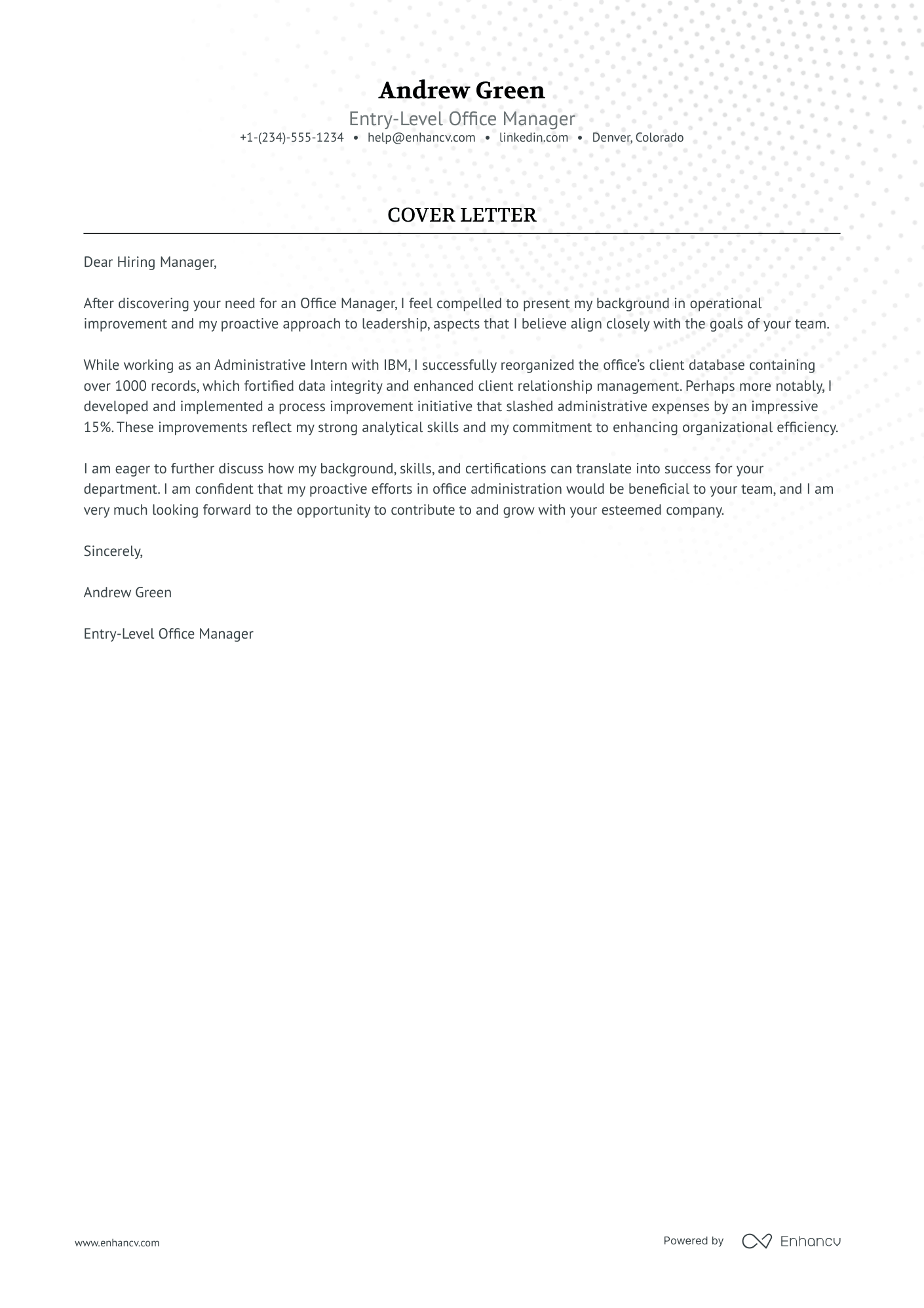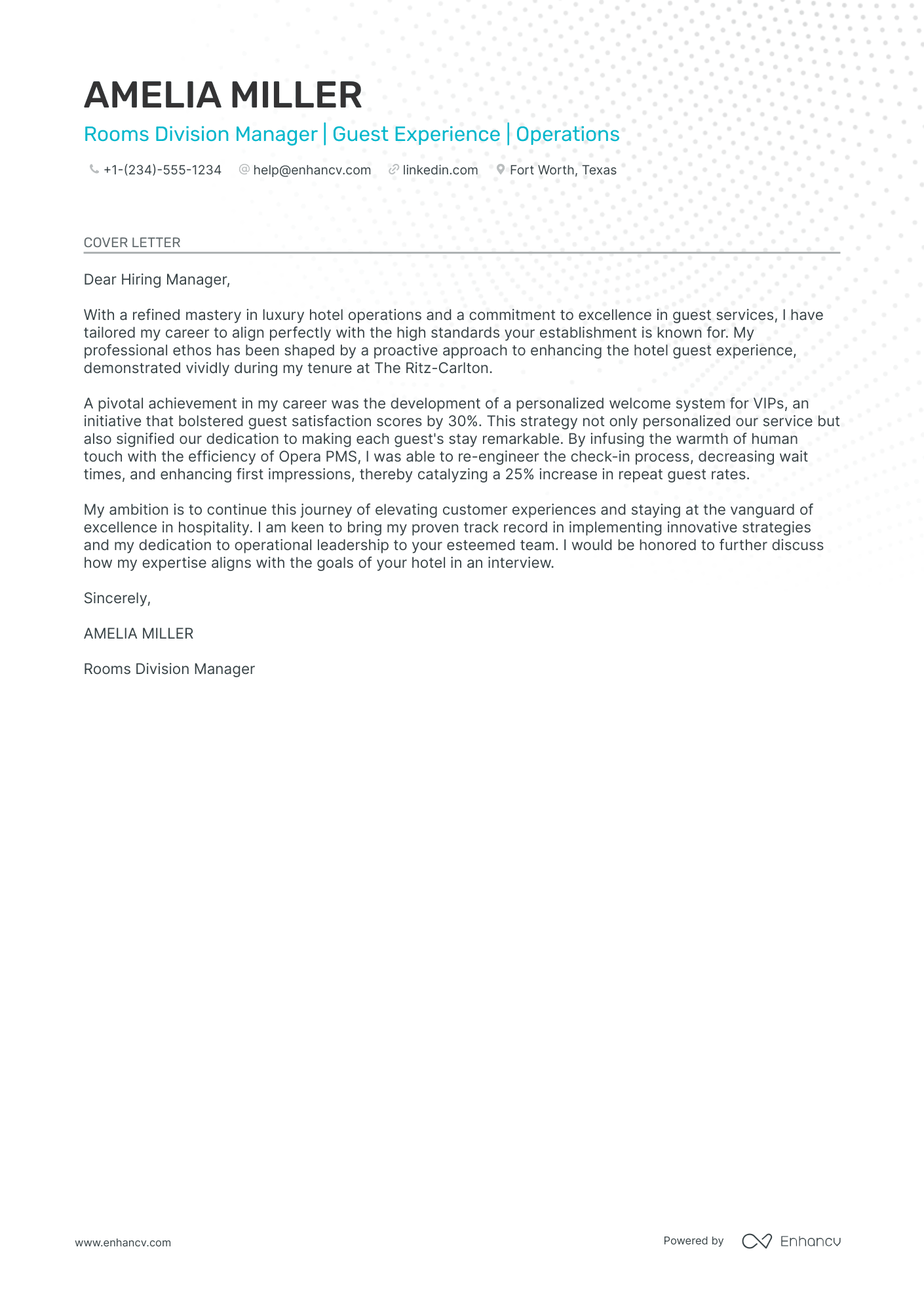Crafting an office manager cover letter can be daunting, especially if you're just starting your job hunt and realizing the importance of this pivotal document. It's not just a repeat of your resume; it's your chance to showcase a signature accomplishment with a compelling narrative. Steer clear of clichés and aim for formality that engages, all within the concise span of one page. Let's tackle this together and transform your cover letter into a memorable introduction.
- Some inspiration from other professionals' job-winning cover letters;
- The best structure and format for your office manager cover letter;
- Insights on how to write about your best achievement to stand out;
- A creative twist on your office manager cover letter intro.
Upload your office manager resume to Enhancv's AI, which will quickly scan and prepare a job-winning cover letter for you.
If the office manager isn't exactly the one you're looking for we have a plethora of cover letter examples for jobs like this one:
Drop your resume here or choose a file.
PDF & DOCX only. Max 2MB file size.
Office manager cover letter example
Carter Andrade
Ottawa
+1-(234)-555-1234
help@enhancv.com
- Demonstrating relevant experience: The cover letter highlights the candidate's direct experience in managing operations and inventory during a period of significant company growth, which is relevant and attractive to potential employers looking for seasoned professionals.
- Quantifiable achievements: It includes specific achievements, such as organizing the monthly distribution of 20,000 magazines, which helps to provide concrete examples of the candidate's capabilities and successes.
- Offering a mix of strategic and practical skills: The letter emphasizes the candidate's ability to provide both strategic vision and practical execution, which suggests a well-rounded individual capable of both planning and implementing operations.
- Invitation to discuss further: The closing paragraph invites the employer to schedule an interview, indicating the candidate's eagerness and availability to engage in further discussions about their fit for the role.
The visual appeal of your office manager cover letter: format, font, and structure
When using our cover letter builder, make sure to include these vital sections:
- Header (with your name, contact details, the role, and date);
- Greeting (that's personalized to the recruiter);
- Introductory paragraph (to capture attention);
- Body paragraph (to tell a story of how you've obtained your job-crucial skills);
- Closing paragraph (ending with a nod to the future ahead);
- Signature (that is not a must).
Our cover letter templates are already set up for you with the best office manager cover letter design with single-spaced paragraphs and a one-inch margin.
As for the font of your office manager cover letter, use the same one as you did in your resume (where modern and simple fonts, like Rubik and Bitter, take precedence over Arial and Times New Roman).
Your office manager cover letter is created with the recruiters in mind - as no Applicant Tracker System looks over this part of your profile.
When sending over your office manager cover letter, download it in PDF. This format allows your information and design to stay intact and to keep the same visual quality.
Tight on time? Our free cover letter generator helps you create a cover letter instantly from your resume.
The top sections on a office manager cover letter
- Header: Include your contact information and the date to ensure the potential employer can easily identify you and reference the correspondence.
- Greeting: Address the hiring manager by name if possible, to add a personal touch and show that you've done your research on the company.
- Introduction: State the position you're applying for and summarize your enthusiasm for the role and the company, highlighting your organizational skills as key to an efficient office environment.
- Body: Detail specific experiences that relate to managing an office, such as improving office systems, handling administrative staff, or managing budgets, to demonstrate your capability to fulfill the duties of an office manager.
- Closing: Reiterate your interest in the role, invite the hiring manager to review your enclosed resume, and express your eagerness to discuss how you can contribute to the efficiency and productivity of the office in a personal interview.
Key qualities recruiters search for in a candidate’s cover letter
- Exceptional organizational skills: Necessary for managing office operations, coordinating meetings, and maintaining files and records.
- Strong leadership and team management abilities: Critical for supervising administrative staff and ensuring efficient office workflows.
- Excellent communication skills: Vital for liaising with internal teams, external clients, and vendors to foster a professional business environment.
- Proficiency in office software and technology: Important for managing electronic data, creating reports, and troubleshooting basic IT issues.
- Experience in budgeting and resource allocation: Required to oversee office expenses, negotiate with suppliers, and ensure cost-effective office management.
- Proactive problem-solving attitude: Essential for addressing office issues swiftly and implementing effective solutions to prevent disruptions in office productivity.
The office manager cover letter salutation: how to address hiring managers
After covering the format of your office manager cover letter, let's look at the salutation.
Back in the day, the cordial "To whom it may concern" or "Dear Sir/Madam", might have worked out fine.
But, nowadays, your cover letter should approach hiring managers on a more personal basis.
So, what to do about your cover letter salutation?
If you've messaged the recruiters and are on a first name basis or a more formal one, use the hiring manager's name in the greeting (e.g. "Dear Sophie," "Dear Ms. Givens", or "Dear Mr. Everett,").
Always aim to make the effort to find out the name of the hiring manager, who'd be assessing your application. Search on LinkedIn, double-check the advert on the corporate website, or message the brand on social media to find out more about the role.
If you can't find the hiring manager's name (and still want to sound professional), use "Dear HR Team,", "Dear Hiring Manager,", or the likes.
List of salutations you can use
- Dear Hiring Manager,
- Dear [Specific Name],
- Dear [Mr./Ms./Dr.] [Last Name],
- Dear [Title] [Last Name],
- Dear [Department] Team,
- Dear Search Committee,
What to include in those first two sentences, or your office manager cover letter introduction
Have you ever wondered what the best way is to present your profile in the office manager cover letter introduction?
There's no right or wrong answer if you're being concise and authentic to yourself.
Some professionals start their office manager cover letter by:
- congratulating the company - focusing on something impressive, whether that's an award, an industry-leading project, or a key event;
- aligning their passion for the field or industry with the job - if you're enthusiastic about what you do, you'd thus grow your skill set and value as a professional.
Choosing your best achievement for the middle or body of your office manager cover letter
Now that you have the recruiters' attention, it's time to write the chunkiest bit of your office manager cover letter.
The body consists of three to six paragraphs that focus on one of your achievements.
Use your past success to tell a story of how you obtained your most job-crucial skills and know-how (make sure to back these up with tangible metrics).
Another excellent idea for your office manager cover letter's middle paragraphs is to shine a light on your unique professional value.
Write consistently and make sure to present information that is relevant to the role.
Thinking about the closing paragraph of your office manager cover letter
Before your signature, you have extra space to close off your office manager cover letter.
Use it to either make a promise or look to the future.
Remind recruiters how invaluable of a candidate you are by showing what you plan to achieve in the role.
Also, note your availability for a potential next meeting (in person or over the telephone).
By showing recruiters that you're thinking about the future, you'd come off as both interested in the opportunity and responsible.
What could you write about in your office manager cover letter when you have no experience
Candidates with zero professional experience often struggle to write their office manager cover letter.
You may lack experience, but your application could still be impressive when you focus on your strengths.
Consider your most relevant talents (and/or one achievement) that align with the role and help you stand out.
Perhaps you spent every summer volunteering at your local dog pound - think of the job-relevant skills this experience taught you.
Sharing your tangible career goals is another good strategy to stand out.
Key takeaways
Winning at your job application game starts with a clear and concise office manager cover letter that:
- Has single-spaced paragraphs, is wrapped in a one-inch margin, and uses the same font as the office manager resume;
- Is personalized to the recruiter (using their name in the greeting) and the role (focusing on your one key achievement that answers job requirements);
- Includes an introduction that helps you stand out and show what value you'd bring to the company;
- Substitutes your lack of experience with an outside-of-work success, that has taught you valuable skills;
- Ends with a call for follow-up or hints at how you'd improve the organization, team, or role.
Office Manager cover letter examples
By Experience
Entry-Level Office Manager
By Role







